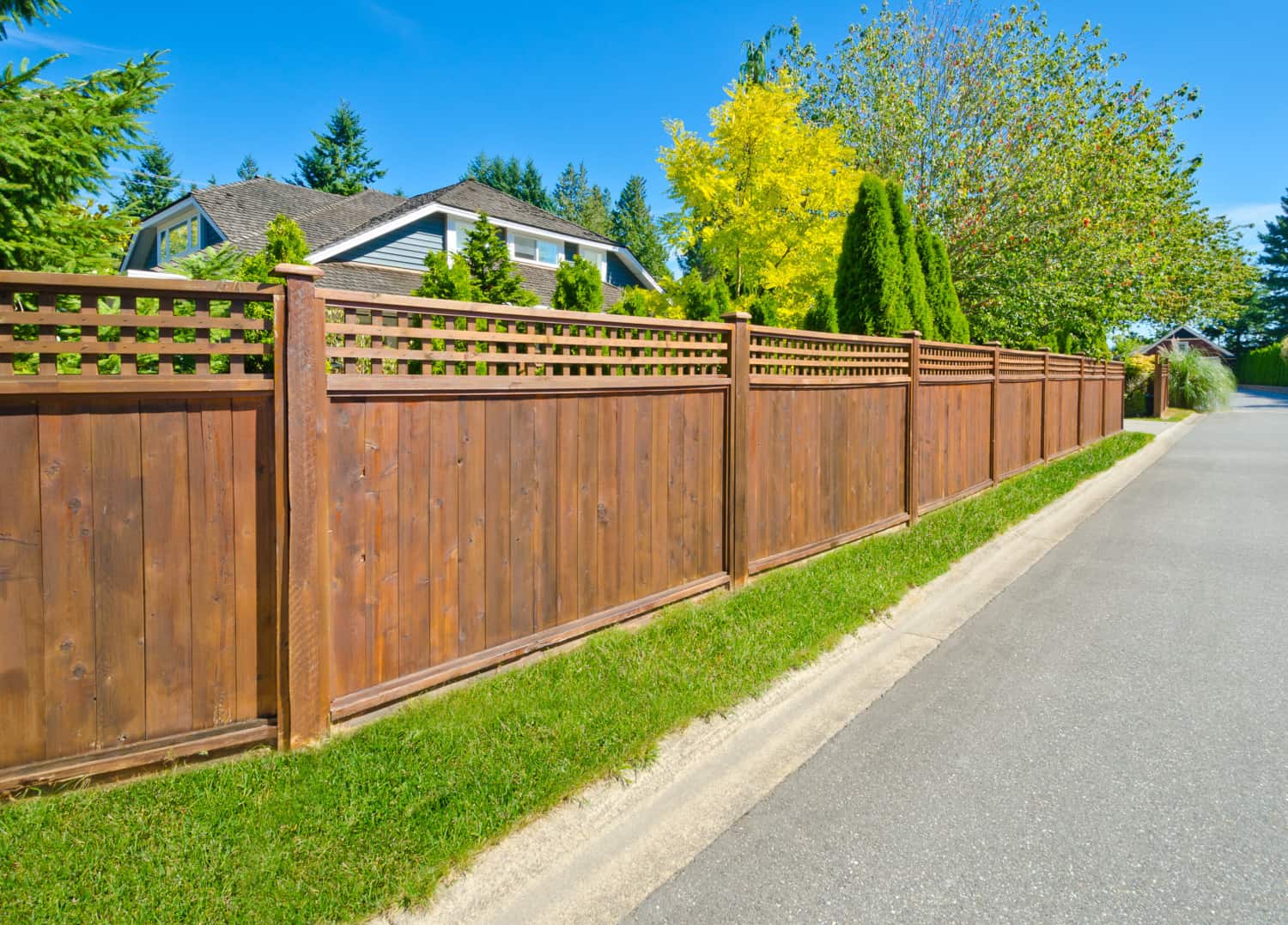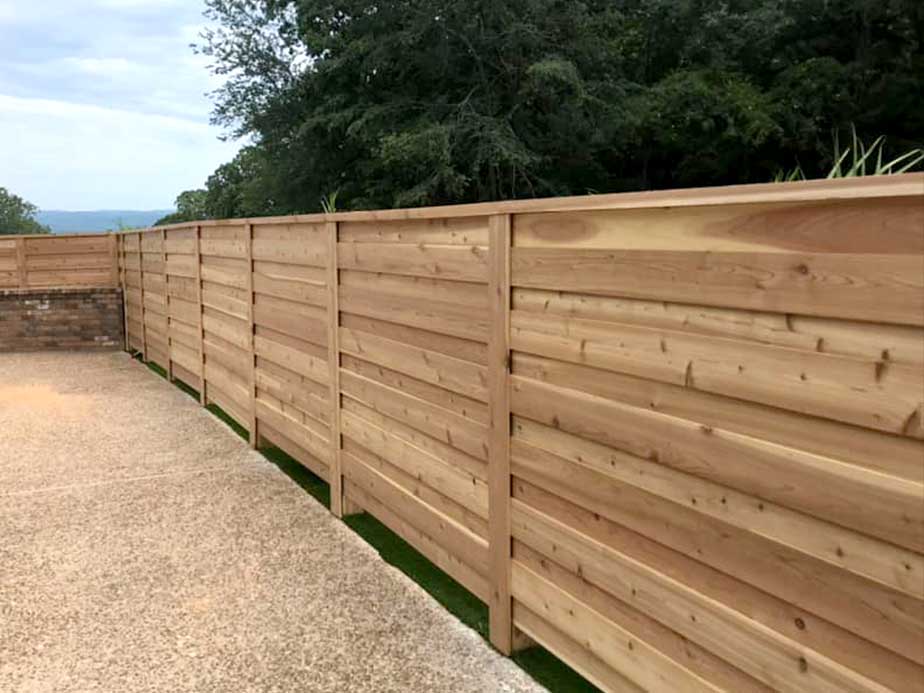All Categories
Featured
Choosing the ideal fence product for your building is a significant decision, and each option comes with its very own set of difficulties and benefits. Timber, plastic, and light weight aluminum are amongst one of the most popular materials for both residential and industrial fence. Here's a breakdown of the benefits and drawbacks of each to aid you decide which is finest for your requirements.
Timber Fence. Pros:
Aesthetic Charm: Timber provides an ageless, all-natural look that complements practically any design of residential property. It can be repainted or discolored in a large range of shades, enabling complete modification. Whether you're going for a rustic, country-style appearance or a much more sleek and refined look, timber is functional.
Cost-Effective: Generally, wood fencings are among one of the most inexpensive choices when it concerns upfront prices. It's a great alternative for those on a budget who desire a quality fencing without a high price.
![]()
Customization: Timber can be conveniently adapted to fit any kind of form or dimension. You can pick from various designs such as privacy, picket, or ranch-style fencings. It's also very easy to change, repair, or change parts if required.
Disadvantages:
Maintenance: Timber fences require normal maintenance. They should be discolored or painted periodically to prevent pest, rot, or bending infestation. Without upkeep, timber can degrade much faster, especially in wet or humid climates.
Susceptibility to Damages: Timber is vulnerable to damage from parasites, such as termites, and climate condition, like high winds, rain, or snow. Over time, exposure to these aspects can trigger the timber to fracture, splinter, or warp.
Shorter Life-span: While wood fences can last for years, they usually have a much shorter life expectancy compared to vinyl or aluminum, especially otherwise maintained consistently.
Plastic Secure Fencing. Pros:
Low Maintenance: Among one of the most attractive features of vinyl fences is that they call for little to no maintenance. Unlike timber, plastic does not need to be painted or tarnished. It's resistant to fading, breaking, and bending, making it suitable for those that want a convenient fence.
Sturdiness: Vinyl fences are unbelievably durable and can hold up against severe weather condition conditions, including severe warmth, heavy rain, or snow. They're additionally resistant to insects like termites, which can damage wood fences.
Lengthy Life expectancy: Plastic fences can last for 20-30 years or even more with marginal maintenance. Numerous manufacturers offer service warranties, giving satisfaction and more improving the value of your financial investment.
![]()
Variety of Styles: Readily available in a variety of styles, colors, and appearances, plastic fences can imitate the look of timber yet without the upkeep. They are offered stylishly like privacy, picket, and ornamental, making them extremely personalized.
Cons:
Higher Preliminary Cost: The upfront cost of vinyl secure fencing is generally greater than wood, making it less budget-friendly for some. Its durability and reduced upkeep make it a rewarding financial investment in the long run.
Fragile in Winter: In chillier environments, plastic can come to be brittle gradually, which makes it a lot more vulnerable to splitting if subjected to impact. This can be an issue in areas with severe wintertimes.
Limited Personalization: While vinyl is available in a selection of styles and shades, it's not as customizable as timber. Plastic may not be the best choice. if you have an extremely specific vision in mind.
Aluminum Fencing. Pros:
Low Upkeep: Aluminum is an additional material that calls for really little maintenance. Unlike wood, it does not rust, corrode, or discolor. This makes it optimal for settings with extreme weather condition or seaside locations where saltwater can trigger corrosion.
Toughness: Aluminum fencings are understood for their strength and long life expectancy. They can endure severe climate, and unlike timber or vinyl, they are immune to bugs and won't weaken gradually.
![]()
Aesthetic Allure: Light weight aluminum fencings give a sleek, sophisticated appearance and are commonly utilized for ornamental purposes. They are available in different designs and surfaces and can improve the general aesthetic appeal of your residential property.
Safety: Light weight aluminum is a sturdy product, making it a superb alternative for providing protection around your building. It's commonly utilized for residential safety fence along with for swimming pool units.
Disadvantages:
Expense: Aluminum fencings are often more pricey than wood and occasionally even vinyl, especially when selecting attractive or custom designs. The preliminary price may be a deterrent for some homeowner.
Much Less Personal Privacy: One of the drawbacks of light weight aluminum is that it commonly supplies less personal privacy compared to timber or plastic. The gaps between the slats or bars can be vast, which allows individuals to see through the fencing. If privacy is necessary to you, this may not be the very best option.
Denting: While aluminum is long lasting, it is prone to denting from heavy influences, such as auto mishaps or criminal damage. While it will not rust, a dent can compromise its look and integrity.
Which Material Should You Choose? The choice in between wood, light weight aluminum, and vinyl fencing comes down to your spending plan, the amount of maintenance you're eager to deal with, and the specific needs of your property. If you prefer a natural, customizable appearance and are prepared to preserve it, timber could be the method to go.
Consider your residential property's climate, the degree of privacy or safety and security you require, and the long-lasting financial investment you're willing to make. Whichever product you pick, each offers one-of-a-kind benefits that can enhance your home or business while offering functionality and style.
Timber Fence. Pros:
Aesthetic Charm: Timber provides an ageless, all-natural look that complements practically any design of residential property. It can be repainted or discolored in a large range of shades, enabling complete modification. Whether you're going for a rustic, country-style appearance or a much more sleek and refined look, timber is functional.
Cost-Effective: Generally, wood fencings are among one of the most inexpensive choices when it concerns upfront prices. It's a great alternative for those on a budget who desire a quality fencing without a high price.

Customization: Timber can be conveniently adapted to fit any kind of form or dimension. You can pick from various designs such as privacy, picket, or ranch-style fencings. It's also very easy to change, repair, or change parts if required.
Disadvantages:
Maintenance: Timber fences require normal maintenance. They should be discolored or painted periodically to prevent pest, rot, or bending infestation. Without upkeep, timber can degrade much faster, especially in wet or humid climates.
Susceptibility to Damages: Timber is vulnerable to damage from parasites, such as termites, and climate condition, like high winds, rain, or snow. Over time, exposure to these aspects can trigger the timber to fracture, splinter, or warp.
Shorter Life-span: While wood fences can last for years, they usually have a much shorter life expectancy compared to vinyl or aluminum, especially otherwise maintained consistently.
Plastic Secure Fencing. Pros:
Low Maintenance: Among one of the most attractive features of vinyl fences is that they call for little to no maintenance. Unlike timber, plastic does not need to be painted or tarnished. It's resistant to fading, breaking, and bending, making it suitable for those that want a convenient fence.
Sturdiness: Vinyl fences are unbelievably durable and can hold up against severe weather condition conditions, including severe warmth, heavy rain, or snow. They're additionally resistant to insects like termites, which can damage wood fences.
Lengthy Life expectancy: Plastic fences can last for 20-30 years or even more with marginal maintenance. Numerous manufacturers offer service warranties, giving satisfaction and more improving the value of your financial investment.

Variety of Styles: Readily available in a variety of styles, colors, and appearances, plastic fences can imitate the look of timber yet without the upkeep. They are offered stylishly like privacy, picket, and ornamental, making them extremely personalized.
Cons:
Higher Preliminary Cost: The upfront cost of vinyl secure fencing is generally greater than wood, making it less budget-friendly for some. Its durability and reduced upkeep make it a rewarding financial investment in the long run.
Fragile in Winter: In chillier environments, plastic can come to be brittle gradually, which makes it a lot more vulnerable to splitting if subjected to impact. This can be an issue in areas with severe wintertimes.
Limited Personalization: While vinyl is available in a selection of styles and shades, it's not as customizable as timber. Plastic may not be the best choice. if you have an extremely specific vision in mind.
Aluminum Fencing. Pros:
Low Upkeep: Aluminum is an additional material that calls for really little maintenance. Unlike wood, it does not rust, corrode, or discolor. This makes it optimal for settings with extreme weather condition or seaside locations where saltwater can trigger corrosion.
Toughness: Aluminum fencings are understood for their strength and long life expectancy. They can endure severe climate, and unlike timber or vinyl, they are immune to bugs and won't weaken gradually.

Aesthetic Allure: Light weight aluminum fencings give a sleek, sophisticated appearance and are commonly utilized for ornamental purposes. They are available in different designs and surfaces and can improve the general aesthetic appeal of your residential property.
Safety: Light weight aluminum is a sturdy product, making it a superb alternative for providing protection around your building. It's commonly utilized for residential safety fence along with for swimming pool units.
Disadvantages:
Expense: Aluminum fencings are often more pricey than wood and occasionally even vinyl, especially when selecting attractive or custom designs. The preliminary price may be a deterrent for some homeowner.
Much Less Personal Privacy: One of the drawbacks of light weight aluminum is that it commonly supplies less personal privacy compared to timber or plastic. The gaps between the slats or bars can be vast, which allows individuals to see through the fencing. If privacy is necessary to you, this may not be the very best option.
Denting: While aluminum is long lasting, it is prone to denting from heavy influences, such as auto mishaps or criminal damage. While it will not rust, a dent can compromise its look and integrity.
Which Material Should You Choose? The choice in between wood, light weight aluminum, and vinyl fencing comes down to your spending plan, the amount of maintenance you're eager to deal with, and the specific needs of your property. If you prefer a natural, customizable appearance and are prepared to preserve it, timber could be the method to go.
Consider your residential property's climate, the degree of privacy or safety and security you require, and the long-lasting financial investment you're willing to make. Whichever product you pick, each offers one-of-a-kind benefits that can enhance your home or business while offering functionality and style.
Latest Posts
Find Outstanding Auto Repair Care from Montclare Auto Repair – Reliable Repairs Await
Published en
1 min read
Why Chicago Drivers Pick Montclare Auto Repair for Dependable Service and Big Savings
Published en
1 min read
Explore WyHy FCU Reduces Your Costs on Financing and Accounts
Published en
1 min read
More
Latest Posts
Find Outstanding Auto Repair Care from Montclare Auto Repair – Reliable Repairs Await
Published May 28, 25
1 min read
Why Chicago Drivers Pick Montclare Auto Repair for Dependable Service and Big Savings
Published May 24, 25
1 min read
Explore WyHy FCU Reduces Your Costs on Financing and Accounts
Published May 24, 25
1 min read